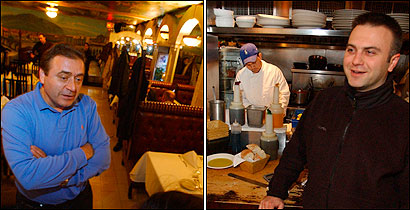Touch of suburbia takes root in city: an Olive Garden coming to Boston has greater implications than you realize
 Donato Frattaroli (left), the owner and executive chef at Lucia Ristorante in the North End, said "gradually all the big chains are moving in." Neb Obradovic (right), an employee at Pomodoro, a North End establishment, said his homey restaurant caters to a different crowd. He said the Olive Garden will draw well from the area. (Globe Photos / Lisa Poole). From "Touch of suburbia takes root in city: Olive Garden opening restaurant in Boston."
Donato Frattaroli (left), the owner and executive chef at Lucia Ristorante in the North End, said "gradually all the big chains are moving in." Neb Obradovic (right), an employee at Pomodoro, a North End establishment, said his homey restaurant caters to a different crowd. He said the Olive Garden will draw well from the area. (Globe Photos / Lisa Poole). From "Touch of suburbia takes root in city: Olive Garden opening restaurant in Boston."One of the things that I have been thinking about lately are the issues involved in building a local economy. I think about this in terms of both the Comprehensive Plan revision process as well as the general "Economic Development" initiatives undertaken by the various agencies of the City government, including the individual councilmembers.
At the Citizen Summit last weekend, there were four issue clusters, and three if you think about it, were deeply interconnected -- jobs development, youth development, and libraries.
Our table included a teen, and she talked about how people like her weren't interested in working in places like McDonalds. We then had a spirited conversation about what kinds of jobs are teens interested in. Another tablemate made an excellent point, that more than anything, entry-level jobs for teens and young adults are really about teaching "work ethic"--going to work every day, performing tasks, working with others, balancing competing tasks, etc.

I then made the point that with "chaining up" of local businesses, there are fewer and fewer opportunities for teens to work in area businesses, do to insurance and other requirements that big chains follow. E.g., I got my start "working" by delivering newspapers, including the Detroit Free Press, but in Washington, DC, only adults deliver newspapers (with the exception of occasional children hawking the Washington Times). My first payroll job was in a Big Boy restaurant, a franchised branch of a regional chain that relied on teen workers for help. But even before then, when I was 9 years old I did odd jobs for store owners when I lived "downtown" in a little town in very western Oakland County not too far from Ann Arbor.
Do kids really have these kinds of opportunities now, and do urban Main Street programs have a role to play in trying to foster connections between youth employment and the local businesses.
I think so. And in some respects, the tax incentive programs attracting chains do have some downsides. This being one--reduced youth employment opportunities.



0 Comments:
Post a Comment
<< Home